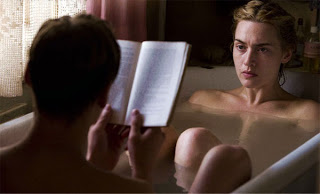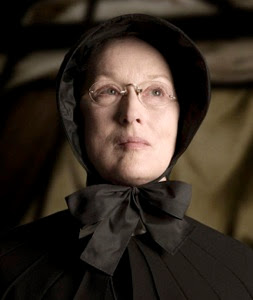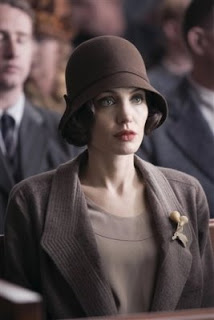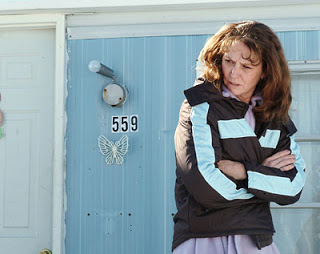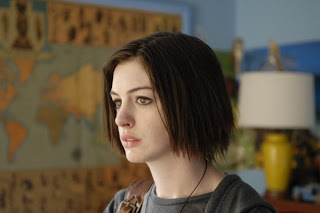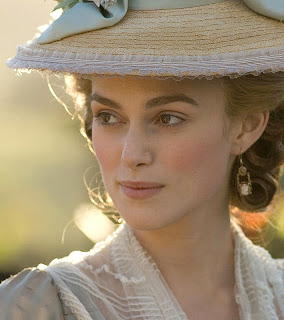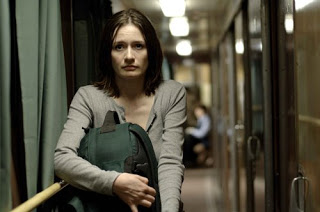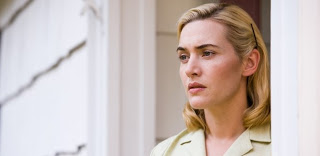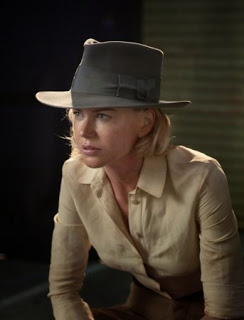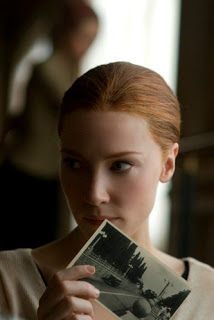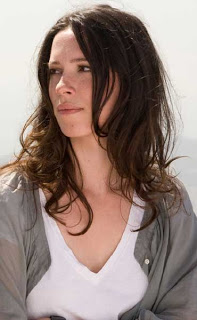NOMINEES
Anne Hathaway – Rachel Getting Married
Angelina Jolie – Changeling
Melissa Leo – Frozen River
Meryl Streep – Doubt
Kate Winslet – The Reader
WILL WIN
I don’t see either Angelina Jolie or Melissa Leo contending here – Changeling doesn’t have seem to have much steam overall, and I’m wagering that the majority of voters haven’t even seen Frozen River. So we’re left with a trio of candidates: Anne Hathaway as the troubled, lacerating drug addict in Rachel Getting Married, Meryl Streep as the no-nonsense nun in Doubt, and Kate Winslet as … well, I can’t really supply any adjectives to define her role, because doing so would give away multiple plot twists, but she has a German accent and gets naked.
Anyway, historians of the Manifesto may recognize a pattern here, and it’s a rather discouraging one, as this race strongly mirrors the lineup going into last year’s Best Actress award. For that contest, Julie Christie entered as the consensus favorite for her role as a woman afflicted with Alzheimer’s in Away from Her, with the plucky Ellen Page a close second as the title teenager in Juno, and French actress Marion Cotillard lurking in the background for her portrayal of French singer Édith Piaf. Christie had been cleaning up on minor awards circuits, but Away from Her had little else going for it, so I played the daredevil and predicted Page would walk home with the Oscar. I was half-right – Christie lost, but it was Cotillard swooping in for the victory.
So do I hang my head in shame and concede defeat this year? Fuck no. Did Harry Potter get downtrodden after Lord Voldemort murdered his parents? O.K. maybe a little, but he pulled himself together, enrolled at Hogwarts, became the youngest Gryffindor Seeker in a century, slayed a basilisk, won the Triwizard Tournament as a 14-year-old, became the first fantasy character in children’s literature to make out with an Asian chick, dumped her when she got annoying and bagged himself a cute redhead instead, and eventually destroyed the most powerful Dark Wizard who ever lived. As far as redemption stories go, that’s pretty impressive, so by comparison I don’t think regrouping and nailing the Best Actress category at this year’s Oscars should be that difficult.
Anyway, Winslet is clearly the frontrunner at the moment – she’s won seven different times already for her work in The Reader, including three biggies (BAFTAs, Golden Globes, and Screen Actors’ Guild Awards). Streep, always an Academy darling, is close behind the pole position; she could even receive a sort of sympathy vote this year, as this is amazingly her eleventh nomination since she last won an Oscar. And Hathaway is an intriguing dark horse pick should the two more prestigious leading ladies ahead of her split the vote; the Academy showed last year they aren’t afraid to reward new blood in this category, and this represents her first nomination.
Now, the truly gutsy move here would be to take Hathaway, and I’m sorely tempted, but there’s just one problem: Her movie is D.O.A., plain and simple. Had Rachel Getting Married received any additional Oscar nominations (Rosemarie DeWitt for Supporting Actress? Jenny Lumet for Original Screenplay?), it might have developed enough momentum for its star to sneak away with the statuette. As it is, Hathaway is on an island, and for whatever reason (possibly because the movie played back in October, and only in limited theatres), her performance hasn’t generated any buzz over the past few months. Don’t worry though, I’m confident we’ll see her back in this category four years from now when she calls her agent and says, “I don’t care who you have to bribe, just get me a part in the new Clint Eastwood drama”.
So that leaves Winslet versus Streep, and call me overconfident, but I actually think it’s an easy choice. Sure, Meryl Streep may be Katherine Hepburn reincarnated, but her opponent isn’t exactly a novice. The Reader represents Winslet’s sixth Oscar nomination, yet she’s never once won (though she should have for both Little Children and Eternal Sunshine of the Spotless Mind); that drought ought to equalize any potential sympathy vote. Throw in that A) Winslet’s movie is the one with the Best Picture nomination, B) Winslet’s movie is produced by Harvey Weinstein, and C) Winslet’s performance is better, and this race suddenly got a whole lot easier. Kate Winslet finally wins a long-deserved Oscar.
SHOULD WIN
Well I’ll be damned. See, I bitch about this category every year. Maybe it’s because there are no good parts for women, maybe it’s because the Academy is stupid, or maybe it’s because I’m a chauvinist, but I’m always wholly dissatisfied with the crop of contenders in the Best Actress race. Not this year. In fact, I’m thoroughly pleased with the acting of each of the nominees. This is not to say I don’t have a preference – after all, people without opinions are indubitably worthless and deserve to die – but I also can’t really complain about any of the selections. Which is cool.
Yet pick a winner I must, so let’s go through each nominee quickly in descending order of preference. Strangely enough, I was actually least impressed with Meryl Streep. She has a lot of fun in Doubt as a nun run amok, and it’s a thoroughly engaging performance, but it lacks the connective emotional tissue of her counterparts’ work. Sister Aloysius may be a fearsome creature operating within a sacred institution, but she rarely comes across as a real person. That’s fine in certain types of movies, but Doubt is a small, character-driven picture, and Streep’s performance lacks a human element.
(To be fair, two of Streep’s scenes contradict this steely persona. The first is an extraordinary confrontation between Streep’s character and the priest played by Philip Seymour Hoffman, during which the priest questions the nun about her past sins. At this point, Streep – heretofore a titan of stolidity and self-control – suddenly breaks down, at first unable to speak before finally trembling “I confessed it, Father!” in a feeble, distraught whimper. It’s a beautiful moment. The second such scene, however, is far less successful. I won’t spoil it, but it serves as the movie’s conclusion, and it strains credulity to say the least.)
Angelina Jolie’s performance in Changeling, in contrast, is far more nuanced and complete. The archetypal role of Christine Collins – a desperate single mother seeking to find her lost son – is perhaps a bit trite, and a less confident actress may have fallen prey to the seductive clutches of wanton sentimentality, but Jolie doesn’t oversell it. She stays true to the character, highlighting Christine’s resolve and anguish in equal measure. Jolie is of course a forceful personality in real life, but that’s mostly incongruous with the woman we see in Changeling; indeed, her wide eyes and pale skin are more conducive in illustrating the movie’s primary emotion of fear. Yet while Christine may be anxious, she is not weak, and there are moments when Jolie – with a squared jaw and clipped delivery – bravely demonstrates her character’s unshakable fortitude.
Fortitude is essentially all Melissa Leo’s character has in Frozen River. Leo also plays a single mother (named Ray), but rather than searching for her child, she is searching for any means of survival – her fantasy is to save enough cash to buy a new trailer for her two sons. She finds opportunity, almost accidentally, in criminality, as Ray smuggles illegal immigrants in the trunk of her car from Canada into New York. The obvious trap in playing the role would be to exploit the overt conflict between morality and survival, with Ray becoming wracked with guilt for her newfound part in the underworld, but Leo possesses greater subtlety and understanding of her character’s predicament. Ray is by no means satisfied with her sudden occupation in lawbreaking, and she does not make excuses for herself; she simply believes it to be necessary, and this recognition lends her a certain defiance. Despite Ray’s desperate circumstances, Leo never errs toward hysterics – in fact, she hardly ever raises her voice – instead grounding Ray with a fierce determination and unyielding love for her children. The movie’s final act may be a stretch in terms of its plot, but by that point Leo’s performance is so convincing that she sells Ray’s actions completely.
Kate Winslet plays an entirely different character in The Reader – insecure, guilt-ridden, and often despondent. Yet she also imbues Hanna Schmitz with an unmistakable authenticity. We are watching a classically trained British actress, yet not once do we question her in her portrayal of German woman whose best available job is a ticket-taker on a train. Winslet shows us all facets of Hanna’s character. Early on, she is remarkably self-assured and delightfully indecent as she coolly seduces a young schoolboy, effortlessly using her body to gain what she wants. Later, however, flickers of doubt emerge – a sharp spoken word, a flash of fear in her eyes – until we finally see her stripped of all dignity in an unforgettable courtroom sequence. In this scene, during which Hanna elects to sacrifice her soul in order to protect her secret, Winslet reveals a woman so utterly wracked with guilt and shame that she is almost revolting. There is not a hint of vanity in her performance, only loathing of her own choice – a choice both selfless and self-aggrandizing – to mask the truth. It is some of the finest acting she has done in her entire career.
Yet my favorite performance of the quintet, unbelievably enough, belongs to Anne Hathaway for her profoundly moving portrayal as Kym in Rachel Getting Married. Kym herself could have been an archetype: the drug-addled loner who returns to a seemingly happy family in order to provide caustic commentary, reveal hidden truths, and in general introduce strife. (Such an outline shaded Michael Shannon’s character in Revolutionary Road.) Strife is certainly an integral element of Rachel Getting Married, yet there is decency too, and Kym’s sense of haughty superiority is burdened by her own recognized failures to live up to that decency. She feels guilty regarding a past event, yes, but she is also saddened by the distance between her and those who cared for her, even though that distance is partially self-inflicted. It’s a truly complex character, and Hathaway plays Kym not as a tortured, self-loathing cynic but as a quietly desperate woman who deeply desires to reconnect with the family from which she has become so severely estranged.
This desperation surfaces most acutely in two remarkable scenes. The first is Kym’s toast at a dinner to Rachel, Kym’s sister who is – as one could glean from the film’s title – about to get married. What follows is roughly a four-minute speech that is agonizingly painful, not only for Kym’s strained, failed attempts at humor but for the palpable sense of detachment (and, in fact, alarm) emanating from her own family. Hathaway plays Kym as highly intelligent and also horribly self-aware; she recognizes the apprehension fixed on the faces before her, and it sickens her, all the more so because she recognizes that she is partially at fault.
The latter scene is a confession at a meeting of addicts. Here, Kym appears somehow less alone than with her family, and she abandons her self-conscious attempts at ingratiating herself with her audience. Instead, she simply talks, her voice barely above a whisper. The tale she tells is abominable, but the aftermath of its telling is the worst of all – there is no catharsis, no shudder of relief. “Thanks for sharing,” someone says softly, and that is all. The tears rolling down Hathaway’s face at the end of this scene signify one of the most genuine emotional moments at the movies this year.
DESERVING
Keira Knightley – The Duchess. Sigh. I am of course on record in claiming that Keira Knightley is the most talented actress of her generation. Her performance here does nothing to change my mind. Showcasing her aptitude both for sly humor and profound emotional trauma – the scene where she delivers her baby is heart-wrenching – this is another stellar performance in what will inevitably be an extraordinary career. Where do I buy my tickets to the midnight showing of The Edge of Love?
Emily Mortimer – Transsiberian. As Al Pacino said in The Devil’s Advocate, it’s fun to be right. I illuminated my passion for Emily Mortimer last year, and that was before I saw this chilling little thriller. Whereas in the past Miss Mortimer melted my heart by playing mild-mannered, achingly sincere women, here she is self-reliant and cocksure, though no less sincere. As an American traveling through Russia by train (good plan!), she appears at first to be pleasant but oddly enigmatic. As the mysteries surrounding her character are revealed, Mortimer creates a fully engaging persona, one whose life-blood and desire are matched against consciousness and restraint. Her trademark sincerity is still present, only it is now channeled into action and even ferocity. In fact, Transsiberian features a show-stopping scene outside a wintry church during which Mortimer – agony etched into her slender, high-boned face – gives herself over to the camera completely. I have said it before, and I will say it again: Emily Mortimer is going to be a star.
(Oh shit! Just for kicks, I started investigating her upcoming films, and guess who the lead female character is in Martin Scorsese’s upcoming Shutter Island? I fucking told you motherfuckers!!!)
Kate Winslet – Revolutionary Road. At this point, she’s the LeBron James of actresses – she’s a good bet for a triple-double whenever she takes the court. I mean, is there anything Kate Winslet can’t do? I wrote two years ago that if people were participating in an “Actress Fantasy Draft”, she’s be the consensus top pick, and that was before she won two Golden Globes in the same year. Her performance in Revolutionary Road is, of course, radically different from her work in The Reader. Whereas Hanna Schmitz was an emotional wellspring, April Wheeler is outwardly composed but silently frantic, yearning against all probability to break away from the “hopeless emptiness” of her existence. It’s a pitch-perfect performance, and that isn’t remotely a surprise.
Nicole Kidman – Australia. Here’s a question: Has Nicole Kidman somehow become underrated? I know she won the Oscar for The Hours (which was really a consolation prize for Moulin Rouge! the year before, but never mind), but that was six years ago, and she’s hardly been heard from since in the press despite excellent performances in Cold Mountain and The Golden Compass. By all rights, Australia should have been her ticket back, but it bombed. Regardless, she’s terrific in it per usual. She starts off playing a caricature – the spoiled wife transplanted to the angry outback – and she takes great joy in playing up the film’s more farcical aspects. As the movie progresses in darker territory, however, she brings a true human element to the proceedings, mingling self-reliance with need and despair. It’s another great performance gone unnoticed. Perhaps Rob Marshall’s Nine (also featuring – holy Oscar-bait – Daniel Day-Lewis, Marion Cotillard, Penélope Cruz, and Judi Dench) will put her back on the map.
Cate Blanchett – The Curious Case of Benjamin Button. If it’s confusing how Nicole Kidman wasn’t recognized for Australia, it’s downright baffling that Blanchett was disregarded for her role as Daisy in David Fincher’s romance. Here’s an actress who already has four Oscar citations to her credit, plus she’s the female lead in the movie that tallied the most nominations out of any film this year, so how the fuck does she get passed over? To be fair, the current nominees for Best Actress range from “very good” to “superlative”, but there weren’t even any whisperings of Blanchett earning a nod. Very strange, especially because she’s hauntingly perfect in Benjamin Button. Brad Pitt’s approach to the title role is necessarily staid, but it’s Blanchett who supplies the movie’s emotional core, and the sorrow and regret she displays during the film’s closing scenes are devastating. On the plus side, we can look forward to seeing her skulk it up as Maid Marian in Ridley Scott’s upcoming Nottingham.
Naomi Watts – Funny Games. She’s really good in it. Don’t ever see the movie. Unless you want to squirm uncomfortably for two hours and then rush home and take a shower, that is.
Rebecca Hall – Vicky Cristina Barcelona. I don’t know what it is, I guess I just have this thing for British actresses who are incredibly talented. Penélope Cruz and Javier Bardem may provide the fireworks in Vicky Cristina Barcelona (whereas Scarlett Johansson is just there for hotness), but it’s Rebecca Hall who supplies the pathos. Her portrayal of a woman conflicted between marital safety and romantic adventure is note-perfect in its realism. As with Emily Mortimer, you’ll hear from her again. (For what it’s worth, I first noticed Hall in the delightful romantic comedy Starter for 10, starring James McAvoy and introduced to me by my friend Raashi. But guess what? Hall also had a pleasant supporting turn just recently in Frost/Nixon. Ca-ching.)
Jeremy Beck is the editor-in-chief of MovieManifesto. He watches more movies and television than he probably should.

